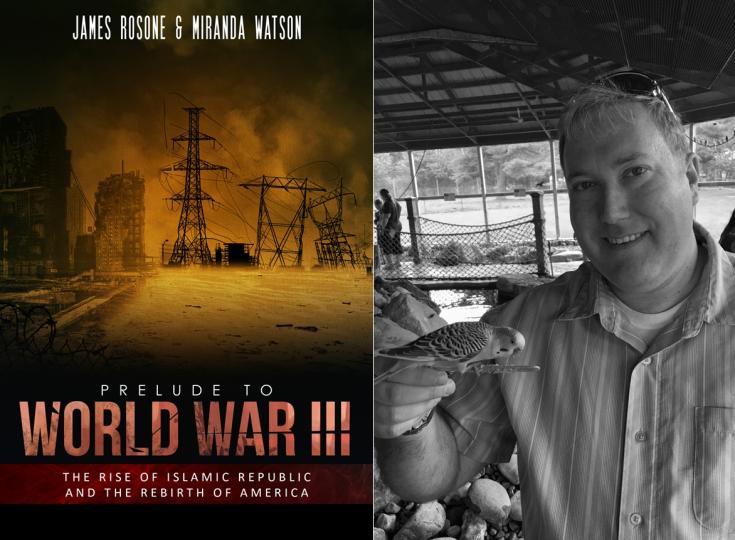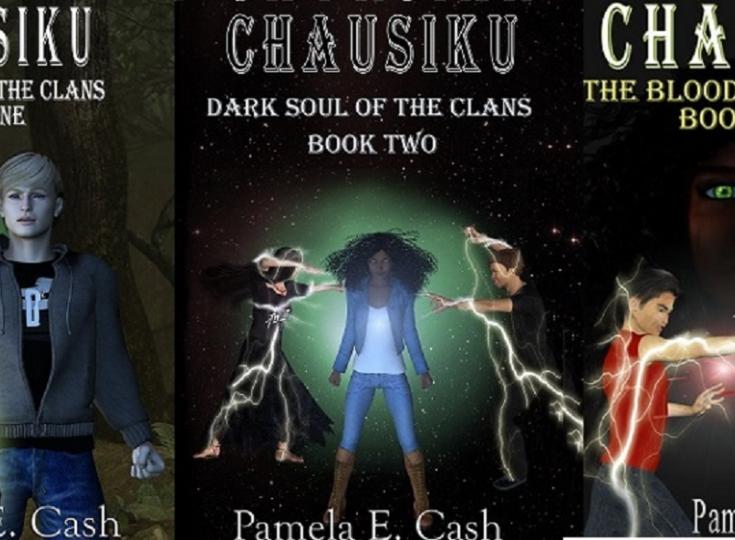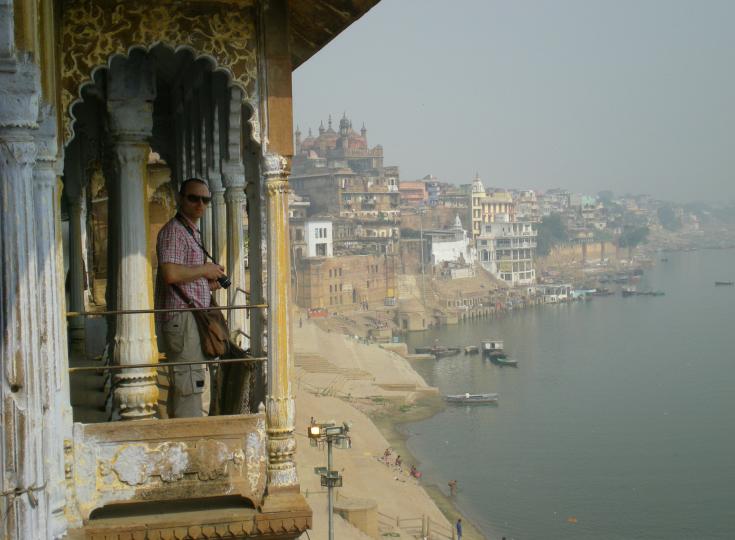James Rosone - Writing Realistic Military Fiction

James Rosone has spent thousands of hours actually talking and interrogating real Al Qaeda terrorists. He knows what it is like to be shelled during a mortar attack, hear 122mm katyusha rockets hit nearby your building or be under fire in a Blackhawk helicopter. All of these experiences have influenced Rosone's ability to convey the realism in his stories, and Prelude to World War III is no exception. As our Author of the Day, Rosone talks about the series, reveals his secret skills and how he manages to keep his readers hooked throughout the book.
Please give us a short introduction to Prelude to World War III - what is it about?
Prelude to World War III is a fictional story of one possible future conflict and how it may play out. The story looks at the US in the 2030s and the rise of a new third political party that rises to power in the US. As the country became mired in a debt crisis, the people became tired of the two parties constantly warring with each other and doing nothing to address the problems of the country. This saw the rise of a new political party, "The Freedom Party" under Henry Stein. Mr. Stein initially won a Congressional seat, then won the Governorship in Florida. From there, he built a nationwide movement that led to him winning the Presidency in 2032. As the country begins to rebuild under the new political party, world powers conspire to fill the power vacuum created by the absence of American power. In the first book, we look at how the Islamic Caliphate comes to power and how they unite the Middle East under one banner. With renewed power and wealth, they quickly look to bring America to its knees and end the Jewish State of Israel. Book one really looks at this conflict.
In your book, the U.S. loses its status as a world Superpower - how likely do you think this scenario is?
I think this is very likely if the US cannot get its debt situation under control. Right now, the US debt is $20+Trillion. By the mid-2030s that will probably top $40+Trillion. The US cannot continue to fund a military that can project power abroad if it is unable to able to fund a military let alone fund the government. There are also a lot of other countries that are growing in power, China, for instance, is the second largest economy in the world, within ten years it will more than surpass the United States. They are also developing their own blue water navy to challenge the US and have doubled and tripled their defense spending more than 15 years in a row. Russia is also a rising power, they have modernized their military and they are looking at only projecting power near their borders, not globally like the US. That is a big difference.
How much has your experience in the Army and Air Force influenced your writing?
Having served in a self-propelled 155mm artillery battalion, I have some experience of what its like to be in a front line combat arms unit. During my time in the Air Force, I was trained as a military interrogator and conducted over 2,000 hours of interrogations in Iraq. This has given me a unique insight into the thinking of terrorists and terrorism as I have actually spent thousands of hours actually talking and interrogating real Al Qaeda terrorists. Having spent 3.5 years in Iraq, I know what it's like to be shelled during a mortar attack, or hear 122mm katyusha rockets hit nearby your building rocking it. Having dirt and dust fall from the ceiling or a ceiling tile falling down on you from a nearby hit. I've also flown in multiple Blackhawk helicopters, some of them coming under fire. All of these experiences have influenced my ability to convey the realism in my stories.
How much research did you have to do to make the plot this plausible?
Following my military service, I also worked as a Department of Defense contractor for US Central Command, US Special Operations Command and US European Command. Having worked for these major commands, I gained a lot of insight into how the US would militarily respond to a conflict, and more importantly, our actual capabilities. Not what you see on TV, but what they are in reality. Having worked at US European Command in the intelligence and operations directorates, I believe the scenarios I've written are incredibly accurate and very plausible as these are scenarios we routinely planned for.
Readers say that this book was hard to put down - how did you manage to capture their attention right throughout?
I believe you just tell me a straight story. Don't try to be politically correct and just paint a realistic picture. At the end of the day, this is fiction. You want to create a fictitious world where people can escape reality and really fall into the book visually. Describing the smells, the textures, the emotions, these are important for creating a realism to a book, characters, and the entire series. We take people on a real roller coaster where it's not the ra ra USA wins. It's a tough fight and it doesn't always look like the US will win. We also show the emotional aspect of what it's like to be on the ground.
One key thing we did in this series is we really incorporated technology. We talk about drone aircraft and tanks, exoskeleton combat suits, cyber warfare and a lot of new technology that the military will most likely integrate in a future conflict.
Another aspect we incorporate great is the perspective from the grunt level, to the Presidential level and everything in between. People like that and we really listen to our readers with each book looking to make them better.
In your book, extremists play an important role. Why?
Extremists play a role in the first and second book mainly because the other superpowers, Russia and China look to leverage them to weaken the US before they launch their own strike. Major powers like to use proxies to start a conflict to weaken their main opponent, then strike. We cannot ignore the fact that extremists are starting to take over more and more of the Middle East. The lure of creating an Islamic Caliphate cannot be underestimated, and once that has been created, who knows for sure how they will act as a united Middle East. What we do know, is the extremists do not like the Jews and they do not like the US. If they have the power, and they see the US weakened, it's not inconceivable that they would try to assert their power.
Besides writing, what other secret skills do you have?
Well, I worked in biometrics and identity intelligence for nearly a decade so I love that aspect of technology. I've also worked the past few years in cyber security doing both cyber assessments and cyber insurance so I have gained experience in that field but more importantly, seen where the vulnerabilities are and what types of attacks are happening. When you combine my previous military and intelligence experience with the technology experience, I can create some incredible stories.
Having interrogated a lot of terrorists, I think like an adversary so I use that in my writing. I think outside the book and look at technology and unconventional ways a conflict may play out. I think that is one of my best secret skills.
Do you have a favorite line from the book, and can you explain what that line means to you?
I don't know that I have a favorite line from the book but more of a theme. The theme is really about rebuilding America. This isn't about MAGA. This book was written way before President Trump announced he was running for President, but his themes almost appear as if he based them off the book.
I would not describe the book as nationalistic, but really it's about America. It's about us coming together as a people for the good of ourselves. If we can take care of each other, then we can be in a position to take care of others. I really believe in the America First policy.
Do you have any interesting writing habits, what's your average writing day like?
LOL, I'm a terrible writer in this regards. I like to have a half-frozen 16oz Red Bull or Rip It energy drink, my noise canceling headphones on rocking out to some music or just pure and utter silence when I'm writing. Sometimes I get hit with writer's block and I end up writing nothing for days at a time. Then it just clicks and I'll sit down and write 12,000 words in a single sitting. I'm kind of sporadic in how I write. I haven't really developed a consistent writing pattern I suppose.
Do you work to an outline or plot or do you prefer to just see where an idea takes you?
I tend to go into a book or series with a rough outline of where I want to go. Then its about figuring out how I want to get there. I would say that in our new series, Red Storm I am doing a significantly better job of writing and sticking to an outline and how I want each book structured. I've recently read the Four Hour Work Week and that book has really changed how I am going to approach writing and pursuing this as a full-time career.
Does this book have an underlying message about basic human nature? What do you hope your readers will take away from it?
The book explores several factors, the sheer evil of men, the love we can express and the righteous anger of a nation. In a way, it really embodies the American spirit of World War II. A nation that wanted to stay out of war but was drawn into it, then the nation rising up from tragedy to liberate the world from tyranny.
How do the other books in the series tie in with this one?
This is a series so the first book really lays the groundwork. This was hard to do because you had to create the scene for the book to take place. One thing I hate is how authors write books like this and do not explain how you got from point A, to point B. I wanted to explain in more details all of those finer points. Each book builds and grows as the world war continues to expand and unravel. You really need to read them in order as each one builds on the previous book.
What are you working on right now?
Right now we are working on our new series "Red Storm". This book series looks at near-term likely conflicts that will occur in the next 2 to 9 years. The first book is called Battlefield Ukraine. This book has already sold over 1,000 copies in the first 13 days it's been released. We look at the conflict in Ukraine and how this could spiral out of control as a new Administration struggles with how to respond to Russia and a seriously weakened and reluctant NATO to stand up to Russia.
Book two is Battlefield Korea which looks at how the Korean conflict may turn out and how the Russians and Chinese may push that war as it would force the US to have to respond when it clearly needs to focus on Russia. It also looks at China and their Greater China policy which includes the annexation of Mongolia, Taiwan and parts of South East Asia.
Book three will be Battlefield Taiwan, book four Battlefield Russia and the final book, Battlefield China. These books are incredible long at 100k+ word count and really examine what war in 2017, 2018 and 2019 would look like against the current superpowers with our current weapons and technologies.
Where can our readers discover more of your work or interact with you?
You can interact with us in a multitude of ways. Facebook https://www.facebook.com/JamesRosone/?ref=aymt_homepage_panel is our world war III page. We also have an author page at www.author-james-rosone.com You can sign up to our newsletter and get the first chapter of our newest book Battlefield Ukraine for free. You can also let us know if you want to join our beta reader group and help us craft these books and make them even better. We are very interactive with our readers and routinely ask them for advice and help or questions on books and other topics.
In the near future, we hope to have our books available in audible hopefully in early 2018.










